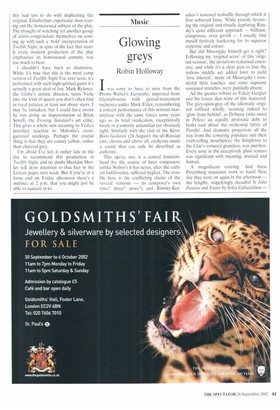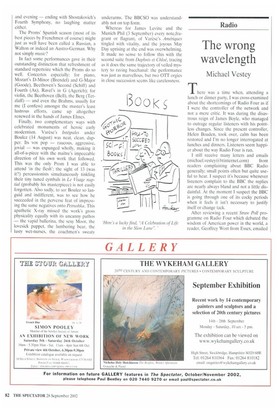Glowing greys
Robin Holloway
Iwas sorry to have to miss from the Proms Weber's Etayanthe, imported from Glyndebourne with period-instrument orchestra under Mark Elder, remembering a concert performance of this seminal masterpiece with the same forces some years ago as its total vindication, exceptionally lovely in a sonority unfamiliar yet obviously right. Similarly with the visit of the Kirov Boris Godunov (24 August): the all-Russian cast, chorus and above all, orchestra made a sound that can only be described as authentic.
This opera, too, is a central fountainhead for the course of later composers; unlike Weber's it has never, after the earliest indifference, suffered neglect. The trouble here is the conflicting claims of the several versions — its composer's own (two? three? more?) and Rimsky-Kor sakov's rescored reshuffle through which it first achieved fame. While piously favouring the original and ritually deploring Rimsky's quite different approach — brilliant, clangorous, even garish — I usually find myself furtively hankering for its superior expertise and colour.
But did Musorgsky himself get it right? Following my 'original score' of this 'original version', the deviations remained extensive; and while it's a clear gain to lose the tedious middle act added later to yield 'love interest', many of Musorgsky's wonderful little touches, and some supreme sustained stretches, were painfully absent.
All the greater tribute to Valery Gergiev and his forces that none of this mattered. The grey-upon-grey of the idiomatic original sufficed wholly, seeming indeed to 'glow from behind', as Debussy (who owed in Pelleas an equally profound debt to both) said about the orchestral fabric of Parsifal. And dramatic projection, all the way from the cowering populace and their truth-telling mouthpiece the Simpleton to the Czar's tortured grandeur, was peerless. Every note in the deceptively plain texture was significant with meaning, musical and human.
A magnificent evening. And these Petersburg musicians work so hard! Next day they were on again in the afternoon — the lengthy, stupefyingly dreadful St John Passion and Easter by Sofia Gubaidulina — and evening — ending with Shostakovich's Fourth Symphony, no laughing matter either.
The Proms' Spanish season (most of its best pieces by Frenchmen of course) might just as well have been called a Russian, a Walton or indeed an Austro-German. Why not simply music?
In fact some performances gave in their outstanding distinction that refreshment of standard repertoire which the Proms do so well. Concertos especially: for piano, Mozart's D-Minor (Brendel) and G-Major (Goode), Beethoven's Second (Schiff) and Fourth (Ax), Ravel's in G (Agerich); for violin, the Beethoven (Bell), the Berg (Tetzlaff) — and even the Brahms, usually for me (I confess) amongst the master's least lustrous efforts, came up altogether renewed in the hands of James Ehnes.
Finally, two complementary ways with celebrated monuments of heroic early modernism. Varese's Integrales under Boulez (14 August) was neat, clean, dapper. Its vox pop — raucous, aggressive, jovial — was expunged wholly, making it all-of-a-piece with the maitre's impeccable direction of his own work that followed. This was the only Prom I was able to attend 'in the flesh'; the sight of 13 (was it?) percussionists simultaneously tinkling their tiny tuned cymbals in Le Visage nuptial (probably his masterpiece) is not easily forgotten. Also sadly, to see Boulez so languid and indifferent, was to see how he succeeded in the perverse feat of impressing the same negatives onto Petrushka. This apathetic X-ray missed the work's gross physicality equally with its uncanny pathos — the vapid ballerina, the sexy Moor, the lovesick puppet, the lumbering bear, the lusty wet-nurses, the coachmen's sweaty underarms. The BBCSO was understandably not on top form.
Whereas for James Levine and the Munich Phil (3 September) every note,fragrant or flagrant, of Varese's Ameriques tingled with vitality, and the joyous May Day uprising at the end was overwhelming. It made no sense to follow this with the second suite from Daphnis et Chloe, tracing as it does the same trajectory of veiled mystery to raving bacchanal: the performance was just as marvellous, but two OTT orgies in close succession seems like carelessness.



































































































 Previous page
Previous page